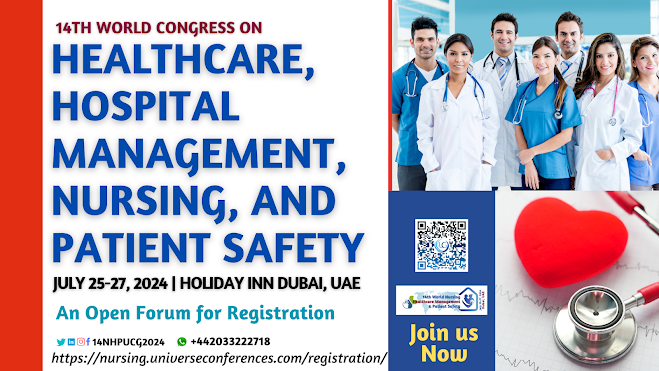What is Patient Education and why is Important?
Patient education refers to the process of providing information and education to individuals about their health, medical conditions, treatment options, and self-care practices. The goal of patient education is to empower patients to make informed decisions about their health and to actively participate in managing their medical conditions. Join us 14th World Healthcare, Hospital Management, Nursing, and Patient Safety Conference from July 25-27, 2024 in Dubai. A gathering that is relevant to your field & and focuses on track-5 Patient Education
Key components of patient education include:
Understanding
the Diagnosis: Providing information about the patient's medical
condition, including the causes, symptoms, and potential complications.
Treatment
Options: Explaining the available treatment options, including
medications, surgeries, lifestyle modifications, and other therapeutic
interventions.
Medication
Management: Educating patients about prescribed medications, including
proper dosages, potential side effects, and the importance of adherence to the
prescribed treatment plan.
Self-Care
Practices: Offering guidance on self-care activities that patients can
incorporate into their daily lives to manage their health. This may include
dietary recommendations, exercise plans, stress management techniques, and
other lifestyle adjustments.
Prevention
Strategies: Providing information on preventive measures to avoid the
onset or worsening of certain medical conditions. This can include vaccination,
screenings, and lifestyle changes.
Communication
Skills: Teaching patients effective communication skills to enable
better interactions with healthcare providers, ask questions, and express
concerns.
Health
Literacy: Ensuring that information is presented in a way that patients
can understand, considering varying levels of health literacy.
Use of
Technology: Incorporating technology, such as educational videos,
online resources, and mobile apps, to enhance the delivery of educational
content.
Effective patient education enhances patient engagement,
promotes adherence to treatment plans, and contributes to better health
outcomes
Why it is important.
Patient education is crucial, which contribute to improving the overall quality
of healthcare and patient outcomes. Here are some key reasons why patient
education is important:
Informed
Decision-Making: Patient education provides individuals with the
information they need to make informed decisions about their health. This
includes understanding their medical condition, treatment options, potential
risks and benefits, and the implications of different choices.
Empowerment:
Education empowers patients to take an active role in managing their health.
When individuals have the knowledge and skills to participate in their care,
they are more likely to adhere to treatment plans and adopt healthier
lifestyles.
Improved
Health Outcomes: Well-informed patients are more likely to comply with
prescribed treatments, medications, and lifestyle modifications. This, in turn,
can lead to better health outcomes, reduced complications, and improved overall
well-being.
Prevention
and Early Detection: Patient education emphasizes preventive
measures and encourages individuals to participate in screenings and early
detection activities. This proactive approach can help identify health issues
at an early stage when they may be more manageable or even preventable.
Enhanced
Communication: Educated patients are better equipped to communicate
effectively with healthcare providers. Improved communication leads to a
stronger partnership between patients and healthcare professionals, fostering a
collaborative approach to care.
Reduction
of Anxiety and Fear: Understanding a medical condition and its
treatment options can alleviate anxiety and fear associated with the unknown.
Patient education helps demystify the healthcare process and promotes a sense
of control and confidence.
Promotion
of Health Literacy: Patient education plays a key role in promoting
health literacy, which is the ability to understand, interpret, and act upon
health information. Improved health literacy is associated with better health
outcomes and a more efficient use of healthcare resources.
Long-Term
Health Management: Chronic conditions often require ongoing management.
Patient education equips individuals with the skills and knowledge necessary
for long-term self-management, reducing the burden on the healthcare system.
Important Information:
Conference Name: 14th World Healthcare, Hospital
Management, Nursing, and Patient Safety
Short Name: 14NHPUCG2024
Dates: July 25-27, 2024
Venue: Holiday inn Dubai, UAE
Email: nursing@universeconferences.net
Visit: https://nursing.universeconferences.com/
Call for Papers: https://nursing.universeconferences.com/submit-abstract/
Register here: https://nursing.universeconferences.com/registration/
Call Us/WhatsApp Us: +12073070027/+442033222718
#education #earlychildhoodeducation #educational #wellaeducation #haireducation #forexeducation #sexeducation #arteducation #mobilebusinesseducation #homeeducation #musiceducation #highereducation
#healthcare #healthcareprofessionals #healthcareprofessional
#healthcareprovider #healthcareadministration #healthcareforall
#healthcaremarketing #healthcareworkers #healthcarelife #health
#healthcareindustry #healthcareproviders





Comments
Post a Comment